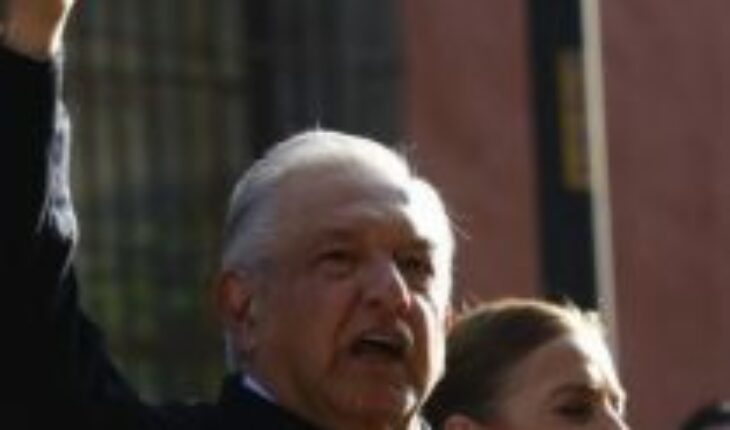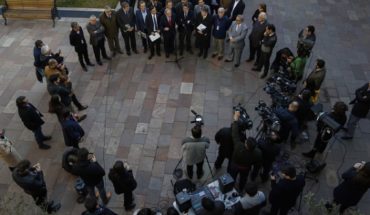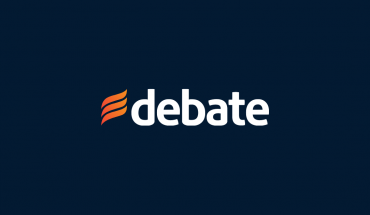The current director of the legislative and political intelligence company Integralia Consultores assures that “this is not to measure whether it is going well or badly. The consultation is to remove someone because it puts the country at risk.”
Paradoxically, the main association promoting this revocation consultation does not seek to get AMLO to leave his post, rather, he led the campaign to keep him in office.
“The goal is not to demonstrate the president’s popularity, that’s what the polls are for. What we want is to set a precedent to exercise this right as citizens, that López Obrador is the first president to submit to the exercise so that it can also be applied in the future to governors and municipal presidents, “responds Jiménez Godoy.
3. But what would happen if AMLO loses?
Dania Ravel, An electoral advisor in the INE, she points to two articles as a basis for understanding what would happen in the unlikely scenario of a majority vote for the revocation of AMLO’s mandate.
“Article 84 of the Constitution establishes that the person who holds the presidency of the Congress of the Union shall provisionally assume the ownership of the Executive Power. [presidencia del país] so that, within 30 days, Congress shall name to whom the term shall end” as president, he points out.
Article 9 of the Organic Law of the General Congress of the United Mexican States, for its part, declares that “the General Congress, constituted in the Electoral College, with the concurrence of at least two thirds of the total of its members, shall appoint interim President of the Republic. The appointment will be granted in secret scrutiny and by a majority vote of the members present.”
After last year’s midterm elections, Morena and its allies lost the qualified majority (two-thirds) of Congress, but still make up more than half of the representatives in the House.
“There should be extraordinary elections to choose the replacement. If Morena could put Lopez Obrador’s replacement, where is the change? If the people put and the people take away, the people are the ones who should put back. It’s all a contradiction,” Ugalde criticizes.
The expert predicts that, if the revocation is won, Mexico could find itself in a scenario of “political instability” until 2024 in which the newly elected president “could become even more radicalized.”
4. And why does the opposition promote not participating?
Given this panorama, the option that has been most popularly promoted in the face of AMLO’s continuity is not to vote for his revocation, but not to participate in the consultation.
Ugalde assures that he will not vote because it is nothing more than “a political rally,a propaganda exercise to ratify the president and measure how beloved he still is” and because none of the ballot options represent him.
“I’m critical of the government like many others, but that doesn’t mean I want him to leave his post now. But if I vote for him to stay, the president will say I’m all for his administration. I don’t see myself represented in the options and that’s why I think abstention is the best way to participate,” he explains.
Faced with criticism that the consultation is nothing more than government propaganda disguised as an exercise in democracy and that there are more important issues in Mexico to attend, Jiménez Godoy responds that everything is “a strategy of the right to delegitimize a work of the citizenry.”
“This has been a job that millions of people have done. to promote democracy. We believe that Mexico must move towards a more direct and participatory democracy and that citizen consultations are more common in our country,” he says.
5. What participation is expected?
Given this scenario, the participation data will be the most anticipated on Sunday night and the key to knowing what reading their supporters and detractors will give to the consultation.
The low voter turnout achieved in the referendum to judge former presidents last year may set a bad precedent. Two months earlier, however, parliamentary elections attracted more than 52% of voters.
Jiménez Godoy, of Que Siga la Democracia, recognizes that it will be difficult to reach the 40% that would make the result binding and predicts the participation of some 30 million people [algo menos del 33% del electorado], pointing as a reason to “the obstacles of the INE” that “at all times wanted to suspend this process”.
The tough confrontation over the regulations and the organization of the process between the electoral management body and the promoters of the Consultation – including the government itself – has been public and notorious, even becoming necessary the positions of the Prosecutor’s Office and Supreme Court between complaints and mutual accusations.
Initially, the INE requested 3,830 million pesos (about US$190 million) to organize the consultation, but the amount authorized by the Chamber of Deputies was much lower.
“Despite that, we continued with this exercise with the resources we had. It’s been a frankly very complicated process.” ravel, counselor of the INE, acknowledges in an interview with BBC Mundo.
Finally, he assures that due to this smaller budget, the INE will deploy some 57,500 polling stations to vote, which is just over a third of the number installed in a federal election.
Ugalde, on the other hand, calculates Sunday’s participation between “12 and 15% of the electorate”, but he believes that will not get AMLO to recognize the failure of the initiative.
“He will accuse that the people wanted to talk, but that the INE blocked that participation, and the end of the story. It will be an irrelevant fact, which will not transcend and in two weeks it will have been forgotten. As happened with the consultation of former presidents, where he forgot about the issue two days later,” he concludes.





